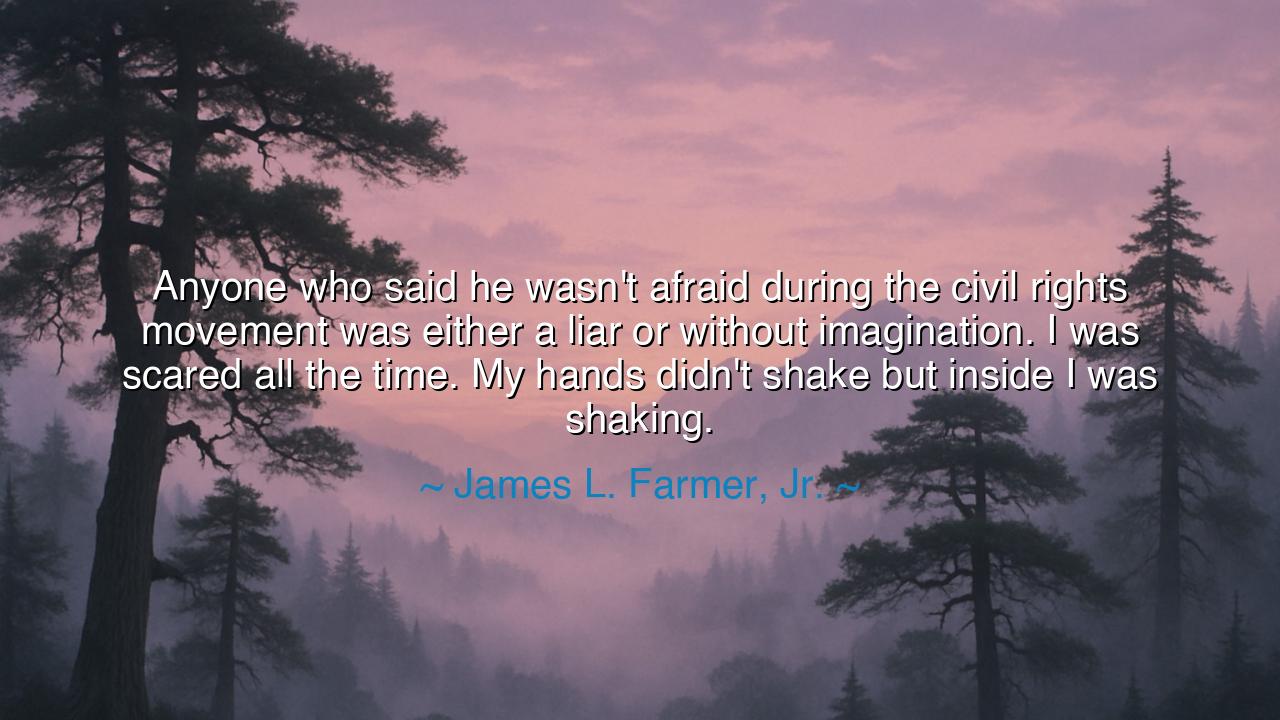
Anyone who said he wasn't afraid during the civil rights movement
Anyone who said he wasn't afraid during the civil rights movement was either a liar or without imagination. I was scared all the time. My hands didn't shake but inside I was shaking.






“Anyone who said he wasn’t afraid during the civil rights movement was either a liar or without imagination. I was scared all the time. My hands didn’t shake but inside I was shaking.” Thus spoke James L. Farmer, Jr., one of the great architects of America’s moral awakening, the founder of the Congress of Racial Equality (CORE), and a man who stood unarmed before the fortress of injustice. His words, stripped of pretense and polished by truth, reveal the secret heart of courage: that it is not the absence of fear, but the mastery of it. In this confession, he gives voice to what every fighter for justice has known—that to battle evil is to walk daily with fear as one’s companion, yet to walk on nonetheless.
The origin of this quote lies in the fierce and uncertain days of the Civil Rights Movement, when Farmer and his brothers and sisters marched against laws, mobs, and systems designed to crush the spirit. He organized the Freedom Rides of 1961, sending interracial groups to test the Supreme Court’s ruling that segregation on interstate travel was unconstitutional. The riders faced firebombs, chains, and death threats. They were beaten by men who believed their cruelty was righteousness. And yet, Farmer admits that he was not fearless. He was, instead, fully human—his heart trembling even as his hands remained steady. For only those who can imagine the danger truly know what it means to stand in defiance of it.
In these words, Farmer gives us a definition of imagination unlike any poet or dreamer might. To him, imagination is not just the faculty that dreams, but the capacity to see vividly the horrors that might come—the jail cells, the lynch ropes, the gunfire—and still to proceed forward. To be “without imagination,” in his eyes, is not to be creative, but to be blind to consequence. Only the one who imagines the full cost of his stand can understand the magnitude of his sacrifice. Thus, fear becomes not a weakness, but the proof of vision. The man who feels nothing cannot love; the man who fears nothing cannot value life. True courage, then, belongs not to those who claim they are unafraid, but to those who carry their fear like a torch in the dark and walk on regardless.
Consider the image of James Farmer, traveling through the South as white men surrounded buses with fire in their hands and hatred in their eyes. Imagine the pounding of his heart as he faced sheriffs who smiled while turning a blind eye to violence. He did not retreat. He did not curse his fear, but accepted it as part of the path. So too did Dr. Martin Luther King, Jr., who wrote from a Birmingham jail cell that “we must use time creatively.” Both men understood that bravery is not born of denial but of endurance—that fear does not diminish righteousness, but illuminates it. For when danger is imagined and yet faced, that is where moral greatness is born.
History remembers the faces of the fearless, but forgets that behind their stillness burned the fires of doubt and terror. Even the prophets of old—Moses before Pharaoh, Esther before the king—trembled before their callings. Yet they answered anyway. The Civil Rights Movement was a modern echo of this ancient struggle: the eternal battle between fear and faith, between silence and the voice of conscience. Farmer’s honesty is a kind of wisdom, a reminder that even heroes bleed, even saints shake. What sets them apart is not that they felt no fear, but that they let purpose speak louder than terror.
O listener, take this truth into your heart: courage is not born in the absence of fear, but in its presence. To be afraid does not mean you are weak; it means you understand what is at stake. The one who fears and still acts is greater than the one who never trembles. The one who sees the dangers of the path and still steps forward walks in the light of the eternal. Do not despise your fear—it is the shadow of your hope, the measure of your love for what you are trying to protect.
Therefore, let this be your lesson: when the time comes to stand for truth, do not wait for fear to fade—it never will. Let it walk beside you, and move anyway. Speak your conviction though your voice shakes; act though your heart pounds. For in that trembling lies your humanity, and in your humanity lies your power. Like James Farmer, hold fast to your vision, and let your imagination not paralyze but propel you. For it is better to move forward shaking than to stand still in silence. And when history remembers you, it will not remember the trembling—it will remember the stride.






AAdministratorAdministrator
Welcome, honored guests. Please leave a comment, we will respond soon